辽宁省阜新市第二高级中学2019-2020学年高二下学期线上考试英语试题(Word版)(无听力试题)
文档属性
| 名称 | 辽宁省阜新市第二高级中学2019-2020学年高二下学期线上考试英语试题(Word版)(无听力试题) |
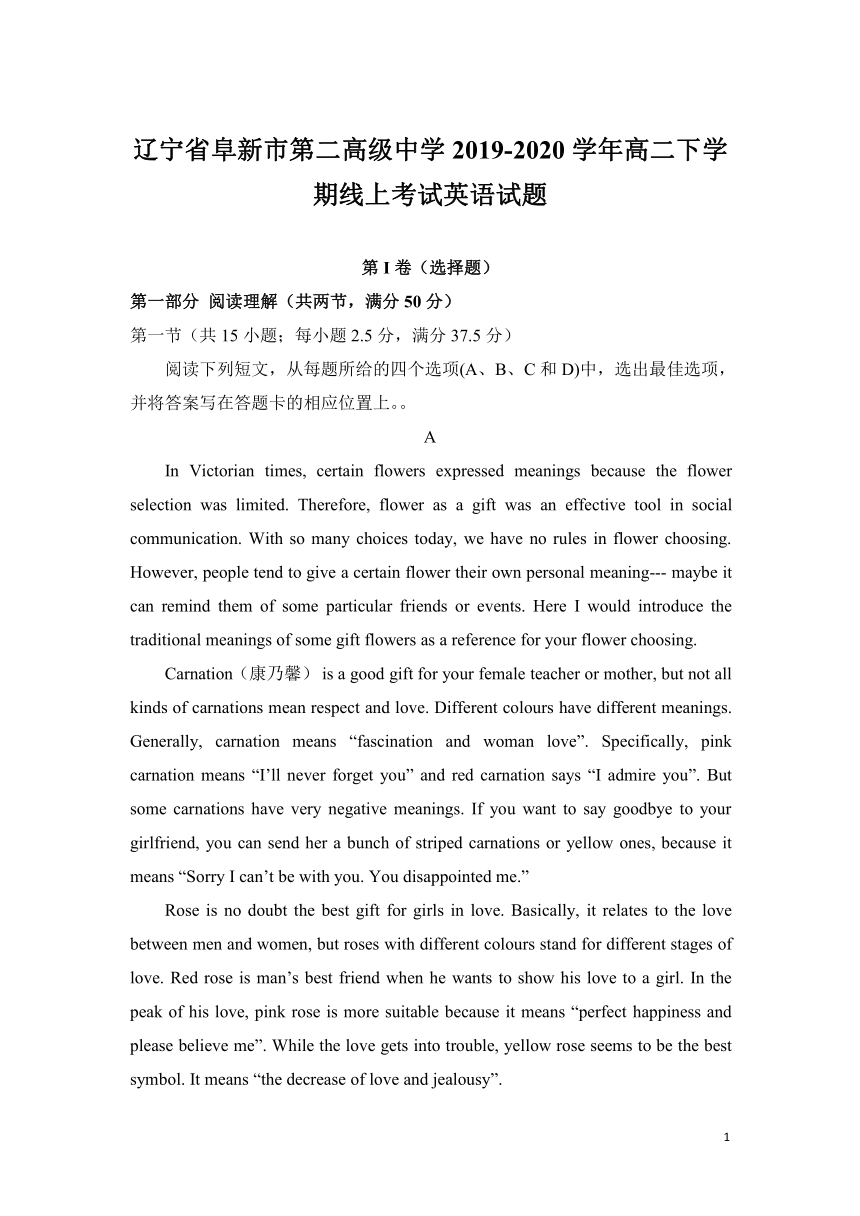
|
|
| 格式 | zip | ||
| 文件大小 | 23.8KB | ||
| 资源类型 | 教案 | ||
| 版本资源 | 外研版 | ||
| 科目 | 英语 | ||
| 更新时间 | 2020-05-12 00:00:00 | ||
图片预览

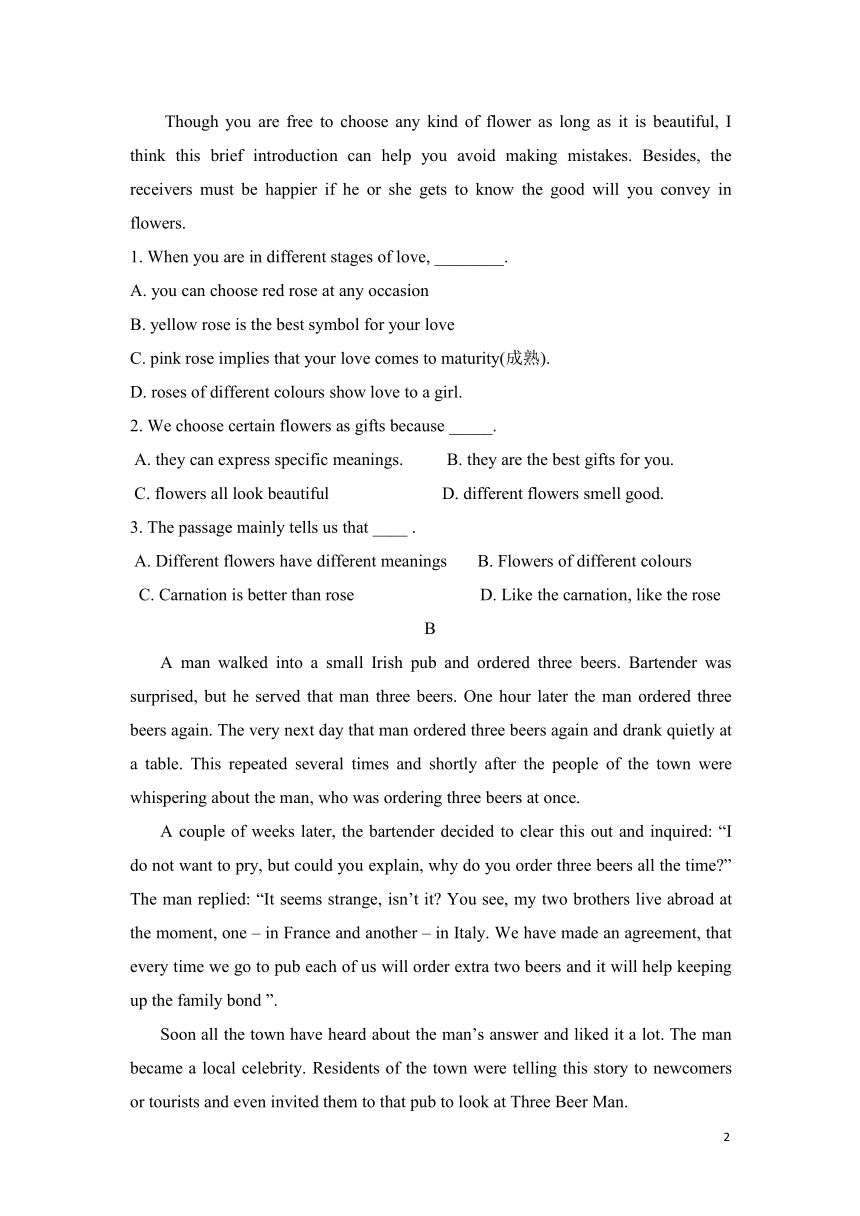
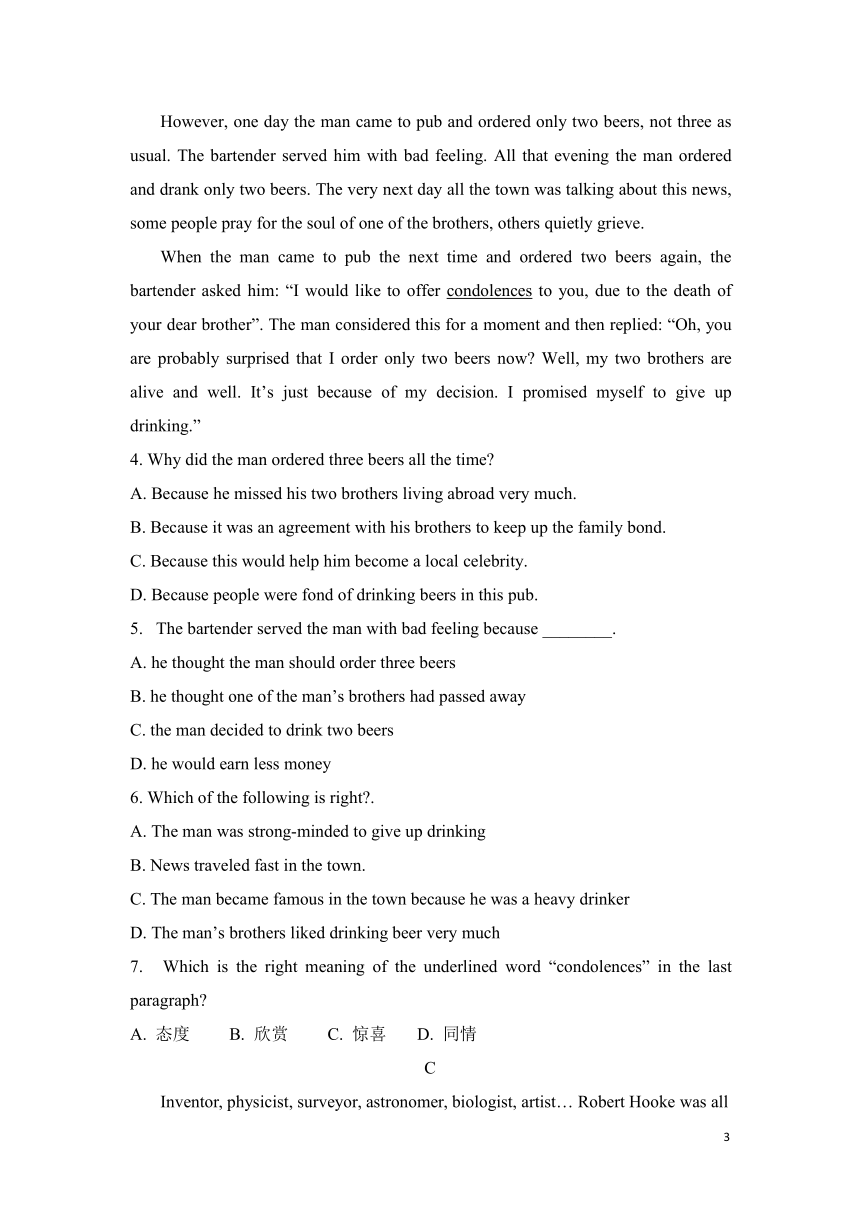
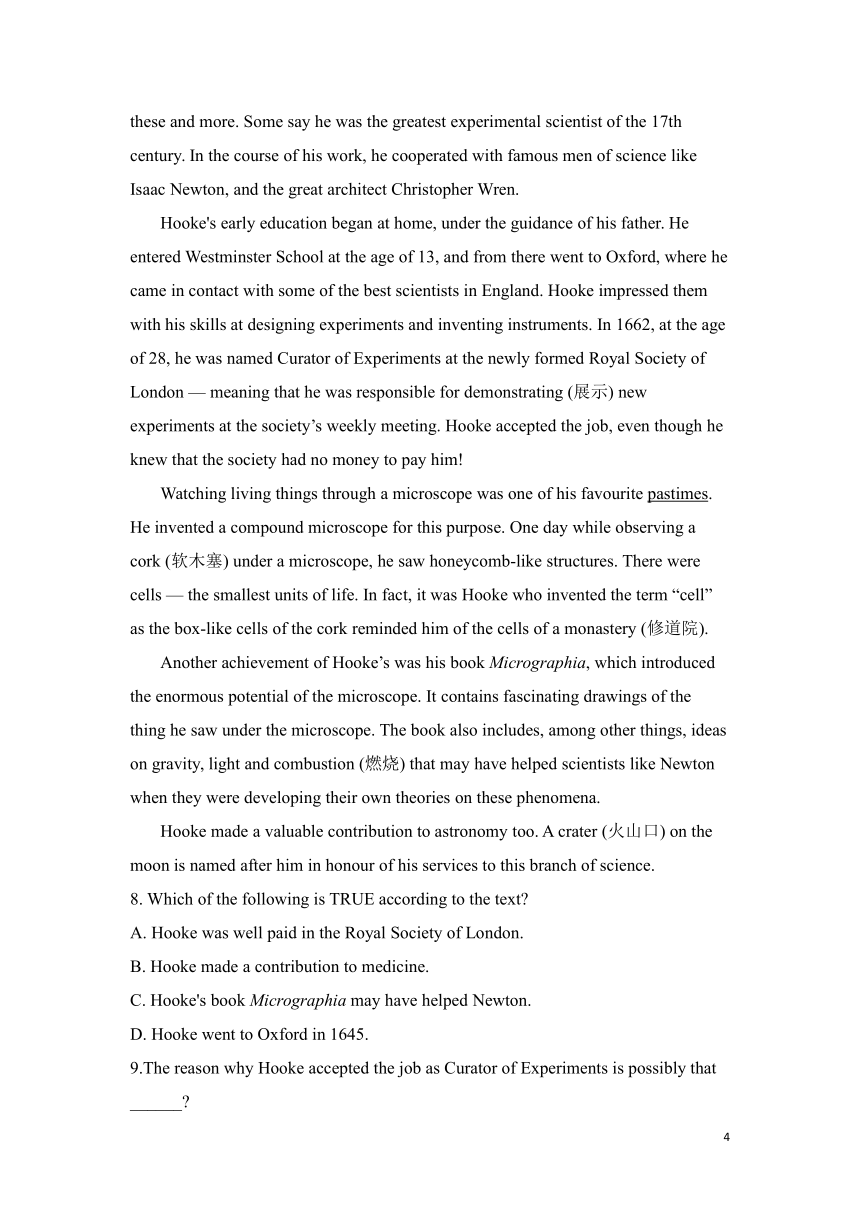
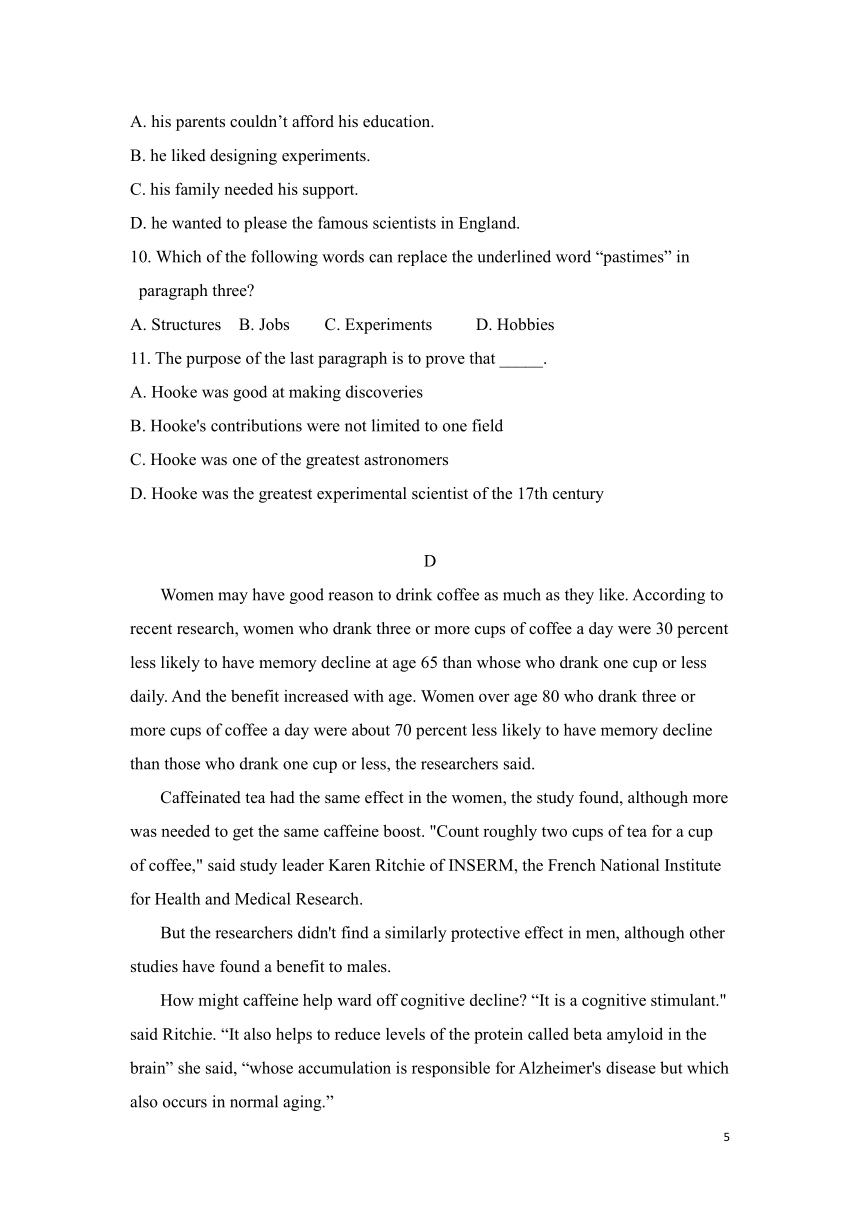
文档简介
辽宁省阜新市第二高级中学2019-2020学年高二下学期线上考试英语试题
第I卷(选择题)
第一部分 阅读理解(共两节,满分50分)
第一节(共15小题;每小题2.5分,满分37.5分)
阅读下列短文,从每题所给的四个选项(A、B、C和D)中,选出最佳选项, 并将答案写在答题卡的相应位置上。。
A
In Victorian times, certain flowers expressed meanings because the flower selection was limited. Therefore, flower as a gift was an effective tool in social communication. With so many choices today, we have no rules in flower choosing. However, people tend to give a certain flower their own personal meaning--- maybe it can remind them of some particular friends or events. Here I would introduce the traditional meanings of some gift flowers as a reference for your flower choosing.
Carnation(康乃馨)?is a good gift for your female teacher or mother, but not all kinds of carnations mean respect and love. Different colours have different meanings. Generally, carnation means “fascination and woman love”. Specifically, pink carnation means “I’ll never forget you” and red carnation says “I admire you”. But some carnations have very negative meanings. If you want to say goodbye to your girlfriend, you can send her a bunch of striped carnations or yellow ones, because it means “Sorry I can’t be with you. You disappointed me.”
Rose is no doubt the best gift for girls in love. Basically, it relates to the love between men and women, but roses with different colours stand for different stages of love. Red rose is man’s best friend when he wants to show his love to a girl. In the peak of his love, pink rose is more suitable because it means “perfect happiness and please believe me”. While the love gets into trouble, yellow rose seems to be the best symbol. It means “the decrease of love and jealousy”.
Though you are free to choose any kind of flower as long as it is beautiful, I think this brief introduction can help you avoid making mistakes. Besides, the receivers must be happier if he or she gets to know the good will you convey in flowers.?
1. When you are in different stages of love, ________.
A. you can choose red rose at any occasion
B. yellow rose is the best symbol for your love
C. pink rose implies that your love comes to maturity(成熟).
D. roses of different colours show love to a girl.
2. We choose certain flowers as gifts because _____.
?A. they can express specific meanings. B. they are the best gifts for you.?
?C. flowers all look beautiful D. different flowers smell good.???
3. The passage mainly tells us that ____ . ?A.?Different flowers have different meanings???????B. Flowers of different colours
C. Carnation is better than rose? D. Like the carnation, like the rose
B
A man walked into a small Irish pub and ordered three beers. Bartender was surprised, but he served that man three beers. One hour later the man ordered three beers again. The very next day that man ordered three beers again and drank quietly at a table. This repeated several times and shortly after the people of the town were whispering about the man, who was ordering three beers at once.
A couple of weeks later, the bartender decided to clear this out and inquired: “I do not want to pry, but could you explain, why do you order three beers all the time?” The man replied: “It seems strange, isn’t it? You see, my two brothers live abroad at the moment, one – in France and another – in?Italy. We have made an agreement, that every time we go to pub each of us will order extra two beers and it will help keeping up the family bond ”.
Soon all the town have heard about the man’s answer and liked it a lot. The man became a local celebrity. Residents of the town were telling this story to newcomers or tourists and even invited them to that pub to look at Three Beer?Man.
However, one day the man came to pub and ordered only two beers, not three as usual. The bartender served him with bad feeling. All that evening the man ordered and drank only two beers. The very next day all the town was talking about this news, some people pray for the soul of one of the brothers, others quietly grieve.
When the man came to pub the next time and ordered two beers again, the bartender asked him: “I would like to offer?condolences?to you, due to the death of your dear brother”. The man considered this for a moment and then replied: “Oh, you are probably surprised that I order only two beers now? Well, my two brothers are alive and well. It’s just because of my decision. I promised myself to give up drinking.”
4.?Why did the man ordered three beers all the time?
A. Because he missed his two brothers living abroad very much.
B. Because it was an agreement with his brothers to keep up the family bond.
C. Because this would help him become a local celebrity.
D. Because people were fond of drinking beers in this pub.
5.? The bartender served the man with bad feeling because ________.
A. he thought the man should order three beers
B. he thought one of the man’s brothers had passed away
C. the man decided to drink two beers
D. he would earn less money
6.?Which of the following is right?.
A. The man was strong-minded to give up drinking
B. News traveled fast in the town.???
C. The man became famous in the town because he was a heavy drinker
D. The man’s brothers liked drinking beer very much
7.? Which is the right meaning of the underlined word “condolences”?in?the last paragraph?
A. 态度??????? B. 欣赏??????? C. 惊喜????? D. 同情
C
Inventor, physicist, surveyor, astronomer, biologist, artist… Robert Hooke was all these and more. Some say he was the greatest experimental scientist of the 17th century. In the course of his work, he cooperated with famous men of science like Isaac Newton, and the great architect Christopher Wren.
Hooke's early education began at home, under the guidance of his father. He entered Westminster School at the age of 13, and from there went to Oxford, where he came in contact with some of the best scientists in England. Hooke impressed them with his skills at designing experiments and inventing instruments. In 1662, at the age of 28, he was named Curator of Experiments at the newly formed Royal Society of London — meaning that he was responsible for demonstrating (展示) new experiments at the society’s weekly meeting. Hooke accepted the job, even though he knew that the society had no money to pay him!
Watching living things through a microscope was one of his favourite pastimes. He invented a compound microscope for this purpose. One day while observing a cork (软木塞) under a microscope, he saw honeycomb-like structures. There were cells — the smallest units of life. In fact, it was Hooke who invented the term “cell” as the box-like cells of the cork reminded him of the cells of a monastery (修道院).
Another achievement of Hooke’s was his book Micrographia, which introduced the enormous potential of the microscope. It contains fascinating drawings of the thing he saw under the microscope. The book also includes, among other things, ideas on gravity, light and combustion (燃烧) that may have helped scientists like Newton when they were developing their own theories on these phenomena.
Hooke made a valuable contribution to astronomy too. A crater (火山口) on the moon is named after him in honour of his services to this branch of science.
8. Which of the following is TRUE according to the text?
A. Hooke was well paid in the Royal Society of London.
B. Hooke made a contribution to medicine.
C. Hooke's book Micrographia may have helped Newton.
D. Hooke went to Oxford in 1645.
9.The reason why Hooke accepted the job as Curator of Experiments is possibly that ______?
A. his parents couldn’t afford his education.
B. he liked designing experiments.
C. his family needed his support.
D. he wanted to please the famous scientists in England.
10. Which of the following words can replace the underlined word “pastimes” in paragraph three?
A. Structures B. Jobs C. Experiments D. Hobbies
11. The purpose of the last paragraph is to prove that _____.
A. Hooke was good at making discoveries
B. Hooke's contributions were not limited to one field
C. Hooke was one of the greatest astronomers
D. Hooke was the greatest experimental scientist of the 17th century
D
Women may have good reason to drink coffee as much as they like. According to recent research, women who drank three or more cups of coffee a day were 30 percent less likely to have memory decline at age 65 than whose who drank one cup or less daily. And the benefit increased with age. Women over age 80 who drank three or more cups of coffee a day were about 70 percent less likely to have memory decline than those who drank one cup or less, the researchers said.
Caffeinated tea had the same effect in the women, the study found, although more was needed to get the same caffeine boost. "Count roughly two cups of tea for a cup of coffee," said study leader Karen Ritchie of INSERM, the French National Institute for Health and Medical Research.
But the researchers didn't find a similarly protective effect in men, although other studies have found a benefit to males.
How might caffeine help ward off cognitive decline? “It is a cognitive stimulant." said Ritchie. “It also helps to reduce levels of the protein called beta amyloid in the brain” she said, “whose accumulation is responsible for Alzheimer's disease but which also occurs in normal aging.”
Ritchie said she wasn't sure why men in the study didn't benefit from caffeine. “Our hypothesis is that either women metabolize caffeine differently than men, or there may be an interaction of the caffeine with the sex hormones,” she said.
The French study confirms previous research, said William Scott, professor of medicine at the University of Miami Miller School of Medicine, who has researched caffeine's beneficial effects against Parkinson's disease, also a neurodegenerative disorder.
As for caffeine only protecting women, Scott noted that just 2,800 of the 7,000 study participants were men, and the results might have differed if more men were included.
A study published in February in the European Journal of Clinical Nutrition looked at 676 healthy men and found that regular coffee drinkers had a lower rate of cognitive decline over a 10-year follow-up than those who didn't drink coffee. Those who drank three cups daily had the least signs of decline.
Both Scott and Ritchie agreed that more study is needed. Ritchie's research will next look at the relationship between caffeine and Alzheimer's.
12. How does coffee influence women’s memory as it is indicated in the 1st paragraph,?
A. The more coffee the woman drank. the more remarkable her memory was.
B. The older the woman was. the more remarkable her memory was.
C. The more coffee the woman drank, the more slowly her memory declined.
D. The older the woman was, the more slowly her memory declined.
13. William Scott would most probably agree that caffeine helped_______________.
A. protect both men and women from diseases
B. reduce the risk of Alzheimer's disease
C interfere with the process of cognitive decline D. balance the production of female hormones
14. According to Ritchie, Alzheimer's disease is resulted from________________.
A. the lack of caffeine in the brain
B. the accumulation of beta amyloid
C. high level of proteins in the brain
D. abnormal metabolism in normal aging
15.Towards the research of caffeine's beneficial effect on men, the author was _____?
A. doubtful B. convinced C. matter-of-fact D. cautious
第二节 (共 5 小题;每小题 2.5 分,满分 12.5 分) 根据短文内容,从短文后的选项中选出能填入空白处的最佳选项。选项中有两项为多余选项。
Could Organizing Your Home Change Your Life?
Marie Kondo is an expert on organizing and cleaning. She is considered an expert on clearing away unused or unnecessary things, better known as clutter. Actually, she did write a book on the issue, which is called “The Life-Changing Magic of Tidying Up”. 16 It has sold more than 2 million copies.
Marie Kondo says people can improve their lives by changing the way they think about all their stuff-- everything from books, documents and photographs to clothing and personal mementoes. “ 17 ” And “this is pretty good,” Ms. Kondo writes.
This is not the first time an organizing expert has written a book on clutter. Other books suggest wonderful things will happen when you organize your home. One book says that if you throw out 50 things from your?home, you will actually find your life. 18 And still others promise a better job, more money and a perfect family if you simply organize the things that fill your life. 19 She told the Business Insider website that some of her clients have lost weight. “Your self-perception is improved by living in a clean and neat room,” she said. “This can change lifestyles and, in turn, appearances.”
Marie Kondo teaches a method of organizing she calls KonMari. It is more of an event or ceremony. This is the part that followers say makes it more lasting. Ms. Kondo says KonMari creates a different relationship between you and your possessions. If the object meant something to you or served you well, you thank it for its service before throwing or giving it away. In her book, Ms. Kondo suggests that you touch the item and ask one simple question: "Does it bring me joy?" 20
A. On the contrary, Marie Kondo disagrees with it.
B. When you put your house in order, you put your affairs and your past in order too.
C. Marie Kondo makes some of the same claims.
D. Another book says that if you make clutter disappear, you will also lose weight.
E. Unnecessary things just take up too much space in your home.
F. If it doesn’t, you give it away so that it may give joy to someone else.
G. Her book is a best-seller around the world.
第二部分:英语知识运用(满分 30 分)
完形填空(共15小题;每小题1分,满分15分)
阅读下面短文,从短文后所给各题的四个选项(A,B,C 和 D)中,选出可以填人 空白处的最佳选项,并将答案写在答题卡的相应位置上。
For?many people today, reading is no longer relaxation. To keep up their work, they must read letters, reports, trade publications, interoffice communications, not to mention newspapers and magazines: a never-ending flood of words. In?getting?a job or advancing in one, the ability to read and comprehend __21__?can mean the difference between success and failure. Yet the unfortunate fact is that most of us are?__22__?readers. Most of us develop poor reading?__23__?at an early age, and never get over them. The main deficiency?__24__?in the actual stuff of language itself—words. Taken individually, words have?little?meaning until they are strung(串起) together into phrases, sentences and paragraphs.?__25__, however, the untrained reader does not read groups of words. He painfully reads one word at a time, often regressing to?reread?words or passages. Regression, the tendency to look back over?__26_ ?you have just read, is a common bad habit in reading. Another habit which?___27___?down the speed of reading is vocalization—sounding each word either orally or mentally as? 28 reads.
To overcome these bad habits, some reading clinics used a(n)?__29__called an accelerator, which moves a bar (or curtain) down the page at a predetermined speed. The bar is set at a slightly faster rate __30_ ?the reader finds comfortable, in order to “stretch” him. The accelerator forces the reader to read fast,?making word-by-word reading, regression and sub vocalization, practically impossible. At first ?_ 31 ?is sacrificed for speed. But when you learn to read ideas and concepts, you will not only read faster, ?__32_?your comprehension will improve. Many people have found?__33__?reading skill drastically (彻底地) improved after some training.?Take?—Charles Au, a business manager, for instance, his reading rate was a reasonably good 172 words a minute?__34__?the training, now it is an excellent 1,378 words a minute. He is delighted?that how he can?__35__?a lot more reading material in a short period of time.
21.?A. easily??????????????B roughly??????????????C. decidedly D. quickly
22. A. curious B. good?????????????????C. urgent? D. poor?????????????
23.?A. habits B. situations??????????C. custom D. training?
24.?A. combines??????????B. touches????????????C. involves D. lies??
25. A. Unfortunately B. Fortunately??????C. Actually?????? ?????D. Logically??????????????
26. A. if B. what????????? C. which???????????? D. that??????????????
27.A. measures B. scales????????? ?C.?cuts??????????? ??D. slows??????????????
28.?A. one????????????? ?B. the one?????????? ?C. reader D. someone
29.?A. screen????????????? ?B. obstacle?????????????C. equipment D. device
30. A. then????????????????????B. beyond???? ????C. than D. as?
31. A. meaning?????????????B. reading???????? ??C. regression D. comprehension?
32. A. for B. but????????? ?C. nor?????????????? D. or??????????????
33.?A. your???????????? B. their???????? ?C. such a D. our
34. A. after B. for??????????? ?C. in?????????????????????????D. before
35. A. come over???????????B. get through C. go over???????????? ?D. get across??????????????
第II卷(非选择题)
(共10小题;每小题1.5分,满分15分)
阅读下面材料,在空白处填入适当的内容或括号内单词的正确形式(不多于3个单词)。
A man was really worried about his son, ___36___ was sixteen years old but had no courage at all. So the father decided to call on a Buddhist monk ___37___(train) his child.
The Buddhist monk said to the boy’s father, “You should leave your son to me. I will make him a man of___38___(brave) within three months. However, you can’t come to see him during that period.”
Three months later, the boy’s father returned. The Buddhist monk arranged a boxing match between the child and a(n)___39___(profession) boxer(拳击手).
Each time the boxer hit the boy, he fell down, but at once the boy stood up. Several times later,the Buddhist monk asked,“___40___ do you think of your child?”
“What ___41___ shame!” the boy’s father said. " I never thought he could be so ___42___ (easy) knocked down. I shouldn’t have left him here at all.”
“I’m sorry that' s all you see. Don’t you see ___43___ each time he falls down, he stands up again instead of___44___(cry)? That' s the kind of courage you wanted him to have.”
If each time you are knocked down and you have the courage to stand up again, then you can be proud ___45___ yourself.
第三部分: 写作 (共两节, 满分 40 分)
书面表达 (共15分)
假设你是李华,前天你收到英国笔友Kathy发来的电子邮件,说她很想报名参加即将在当地举办的“汉语民歌演唱比赛 (Singing Chinese Folk Songs Contest)”活动,但信心不足。请你给她回复一封邮件,内容包括:
鼓励她报名参加;2. 帮助分析参加的意义; 3. 给她提几点建议
注意:1. 字数80字左右;
2. 可适当增加细节,以使行文连贯;
3.开头已经给出,不计入总字数。
Dear Kathy,
I’m glad to know that _________________________________________________________________ _______________________________________________________________________________________
______________________________________________________________________________________________________________________________________________________________________________
Yours,
Li Hua
读后续写 (共25分)
阅读下面短文,根据所给情节进行续写,使之构成一个完整的故事。
A long time ago,there was a huge apple tree. A little boy loved to come and play around it everyday. He climbed to the top,ate the apples,took a nap under the shadow...He loved the tree and the tree loved to play with him.
Time went by...The little boy had grown up and he no longer played around the tree every day.
One day,the boy came back to the tree,looking quite sad.“Come and play with me,”the tree asked the boy.“I am no longer a kid. I don’t play around trees anymore.”The boy replied,“I want toys. I need money to buy them.” “Sorry,but I don’t have money...but you can pick all my apples and sell them. So you will have money.” The boy was so excited. He grabbed all the apples on the tree and left happily. The boy never came back after he picked the apples. The tree was sad.
One day,the boy returned and the tree was so excited.“Come and play with me!” the tree said. “I don’t have time to play. I have to work for my family. We need a house for shelter. Can you help me?” “Sorry,but I don’t have a house. But you can chop off my branches to build your house.” So the boy cut all the branches off the tree and left happily. The tree was glad to see him happy but the boy never came back since then. The tree was lonely and sad again.
One hot summer day,the boy returned and the tree was delighted.“Come and play with me!” the tree said.“I am sad and getting tired.I want to go sailing to relax myself. Can you give me a boat?” “Use my trunk to build your boat. You can sail far away and be happy.” So the boy cut the tree trunk to make a boat. He went sailing and never showed up for a long time.
注意:
1.所续写短文的词数应为150左右;
2.至少使用5个短文中标有下划线的关键词语;
3.续写部分分为两段,每段的开头语已为你写好;
4.续写完成后,请用下划线标出你所使用的关键词语。
Paragraph 1:
Finally,the boy returned after he left for so many years.__________________________
____________________________________________________________________________
____________________________________________________________________________
____________________________________________________________________________
Paragraph 2:
This is a story of everyone. The tree is actually our parents._________________________
_____________________________________________________________________________
_____________________________________________________________________________
_____________________________________________________________________________
阅读部分 1-5 CAABB 6-10 BDCBD 11-15 BDCBC 16-20 GBDCF
完型填空 21-25 DDADA 26-30 BDADC 31-35 DBBDB
语法填空 36. who 37. to train 38. bravery 39. professional 40. What
41. a 42.easily 43.that 44.crying 45.of
写作 第一节
Dear Amanda,
I am glad to know that you are interested in the Singing Chinese Folk Songs Contest to be held in your hometown. It is a good chance to show your talent for music, so I encourage you to sign up for it.
Actually, there is no need to worry about whether you will win or lose. What matters most is that you can improve your Chinese by participating in the contest. What's more, in the activity you can make more friends who are interested in learning Chinese. If you want to do a great job, you should do more practice before the contest. Of course, it is a good idea to listen to some Chinese music programs before the contest so that you can get a much better understanding of Chinese fold music.
I am sure you can do a good job! Looking forward to your reply!
Yours,
Li Hua
第二节
Paragraph 1:
Finally, the boy returned after he left for so many years. “Sorry, my boy. But I don’t have anything for you anymore. No more apples, no more branches and no more trunk. The only thing left is my dying roots,” the tree said with tears. “I don’t need much now, just a place to rest. I’m tired after all these years.” The boy replied. “Good! Old tree root is, just a place to rest. Come, sit down with me and rest.” The boy sat down and the tree smiled with tears...
Paragraph 2:
This is a story of everyone. The tree is actually our parents. When we were young, we loved to play with Mom and Dad, when we grow up, we leave them and only come when we need something or when we’re sad. No matter what happen, parents are always there and ready to give everything they have to make us happy. You may think that the boy is cruel to the tree but that’s how all of us treating our parents.
同课章节目录
